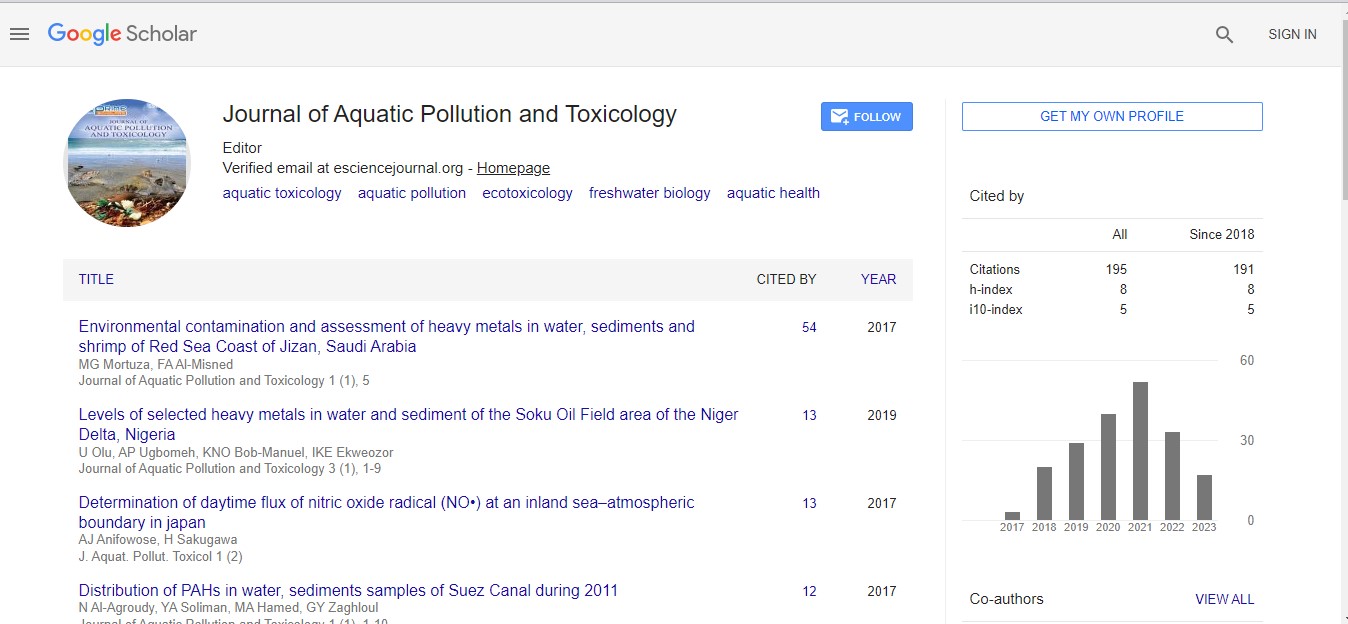Perspective - (2023) Volume 7, Issue 4
Domestic, Industrial, and Commercial Activities Understanding the Importance of Sewage Management
Patricia Anderson*
Department of Oceanography Sciences, Cornell University, USA
*Correspondence:
Patricia Anderson,
Department of Oceanography Sciences, Cornell University,
USA,
Email:
Received: 29-Nov-2023, Manuscript No. IPJAPT-24-18925;
Editor assigned: 01-Dec-2023, Pre QC No. IPJAPT-24-18925 (PQ);
Reviewed: 15-Dec-2023, QC No. IPJAPT-24-18925;
Revised: 20-Dec-2023, Manuscript No. IPJAPT-24-18925 (R);
Published:
27-Dec-2023, DOI: 10.21767/2581-804X-7.4.38
Introduction
Sewage, often overlooked and taken for granted, plays a
crucial role in maintaining public health and preserving the
environment. The effective management of sewage is essential
for preventing the spread of diseases, protecting water
resources, and ensuring a sustainable future. In this article, we
will delve into the significance of sewage and the importance
of responsible sewage management. Sewage is a term
used to describe the wastewater generated from domestic,
industrial, and commercial activities. This includes water from
toilets, sinks, showers, and various industrial processes. The
composition of sewage is diverse, containing a mix of water,
organic matter, chemicals, and pathogens. Without proper
treatment and disposal, sewage can pose serious health and
environmental risks. One of the primary reasons for treating
sewage is to safeguard public health.
Description
Raw sewage is a breeding ground for harmful bacteria,
viruses, and parasites that can cause a range of diseases.
Contaminated water can lead to the spread of illnesses such
as cholera, dysentery, and gastroenteritis. Proper sewage
treatment is, therefore, crucial in preventing waterborne
diseases and protecting the well-being of communities. In
addition to posing risks to human health, untreated sewage
can have severe consequences for the environment. When
discharged into water bodies without proper treatment,
sewage introduces excess nutrients like nitrogen and
phosphorus, leading to water pollution. This can result in
algal blooms, oxygen depletion, and the deterioration of
aquatic ecosystems. Moreover, untreated sewage may contain
harmful chemicals and heavy metals that can harm plants,
animals, and the overall biodiversity of aquatic environments
as global populations continue to grow, the demand for water
increases, making responsible water management a priority.
Treating and reusing sewage can contribute to sustainable
water practices. Wastewater treatment plants play a crucial
role in purifying sewage and producing treated water that can
be safely released into the environment or reused for nonpotable
purposes such as irrigation and industrial processes.
While the importance of sewage management is clear, many
regions around the world face challenges in developing and
maintaining adequate sewage infrastructure. In some areas,
lack of proper sanitation facilities leads to open defecation
and the direct release of untreated sewage into water bodies.
Addressing these infrastructure gaps is essential for improving
public health, protecting the environment, and fostering
sustainable development. Advancements in technology have
paved the way for innovative sewage treatment methods.
From traditional sewage treatment plants to decentralized and
nature-based solutions, various approaches are being explored
to enhance efficiency and sustainability.
Conclusion
Additionally, the concept of wastewater-to-energy is gaining
traction, where sewage is treated to produce biogas or other
forms of energy, contributing to renewable energy sources.
Building awareness about the importance of responsible
sewage management is crucial for fostering a sense of
community responsibility. Educating the public about the
proper disposal of waste, the significance of sewage treatment,
and the impact of individual actions on the environment can
lead to more sustainable practices and a cleaner, healthier
future. In conclusion, sewage management is an integral part
of maintaining public health, protecting the environment, and
ensuring sustainable water resources. As we face growing
challenges related to population growth and urbanization, it
is imperative to prioritize responsible sewage treatment and
disposal. By investing in infrastructure, embracing technological
innovations, and promoting community awareness, we can
collectively contribute to a cleaner and healthier world.
Citation: Anderson P (2023) Domestic, Industrial, and Commercial Activities Understanding the Importance of Sewage Management. J Aquat Pollut Toxicol. 7:38
Copyright: 2023 Anderson P. This is an open-access article distributed under the terms of the Creative Commons Attribution License, which permits unrestricted use, distribution, and reproduction in any medium, provided the original author and source are credited.

